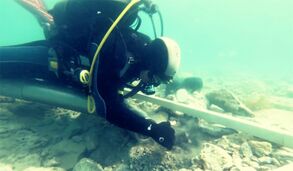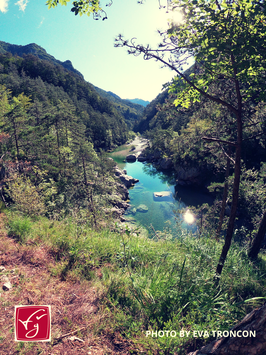
The final goal is very ambitious: to create a real “submerged museum” around the shipwreck's site, both by developing an underwater archaeological park and also through the implementation of a virtual and augmented reality trail which will expand the accessibility of the submerged wreck. “Grado 2” was discovered by a fisherman in 1999 not far from the site where the wreck of another Roman ship was found in the Gulf of Grado, the “Julia Felix” ship.
The agreement signed between the Mibact Regional Secretariat and ERPAC FVG, with the involvement of the universities of Udine, Venice and Salento, will allow to proceed to a total cleaning and highlighting of the parts of the wreck that emerge from the seabed, to a stratigraphic survey to ascertain the depth of the deposit and the presence of wooden remains of the hull, to the production of complete documentation and to an extension of the coverage with modular metal gratings, useful for the protection and use of the site. All these interventions will be funded by the UnderwaterMuse Project. The Regional Secretariat of Mibact will be responsible, through the FVG Superintendency of Archaeology, Fine Arts and Landscape, as the implementer of the agreement for the scientific and operational direction of the interventions, with the support of the University of Udine.
«This agreement is of particular importance because it consolidates the collaboration between ERPAC FVG, universities, research centres and the Ministry, a fundamental aspect to work on in the future for new projects – underlined Anna Del Bianco, ERPAC FVG General Director – But above all, through this project we will be able to combine the theme of the enhancement of cultural heritage with that of sustainable tourism».
«Thanks to this agreement – declared Regional Secretary Roberto Cassanelli and Simonetta Bonomi, FVG Archaeology, Fine Arts and Landscape Supervisor – the project already started by the Ministry in the past years, and which provided for the study, investigation and protection of the archaeological area, can be further developed. This is the starting point, but the real challenge is to be able all together to identify the best strategies for the in situ musealization of the wreck, on one hand respecting the need for protection, and on the other favouring the widest accessibility, also through the recourse to virtual and augmented reality».
About the UnderwaterMuse Project
ERPAC FVG – the Regional Institute for the Cultural Heritage of Friuli Venezia Giulia is the leading authority of the UnderwaterMuse Project, which is part of the Interreg V-A Italy – Croatia CBC 2014-2020 Programme. The project involves the Italian regions of Friuli Venezia Giulia, Veneto and Puglia along with Croatia, and aims at making natural and cultural heritage a leverage for a sustainable and more balanced territorial development.
The Adriatic sea and its strategic position is at the very root of the programme: having been at the centre of trading routes since even before the Romans, its seabed still keeps trace of the countless trails left by the peoples living on its seashore, on both the Oriental and Eastern sides. And, by the shores, the ruins of landing places, harbors or inhabited villages are still visible. Such peculiarity gave the impulse to propose the cultural improvement as a strong point towards the local development.
The project aims at applying on sample areas as the maritime landscapes of Torre Santa Sabina (near Brindisi, in Puglia), Grado, Resnik/Siculi (in Croatia), Venice or Caorle (in Veneto) a methodological and technological protocol based on research&knowledge and development&communication of an underwater archeological site that is complex and multi-stratified, characterized by strong diversity. The objective is to transform the site into an underwater archaeological park or eco-museum, through innovative and/or experimental methodologies and techniques in order to try to reduce the loss of important cultural heritages, as well as to guarantee an economic spin-off deriving directly from the creation of a sector linked to the tourist-cultural promotion of the context of reference.
Here's a list of the Institutions involved: Regione Friuli; MIBACT FVG; Soprintendenza Archeologia, Belle Arti e Paesaggio FVG; Comune di Grado; Università degli Studi di Udine; Università Cà Foscari Venezia – Maritime Archaeology Department; Università del Salento; Regione Puglia; Europuglia; Municipality of Kaštela; RERA – Public Institution for Coordination and Development of Split-Dalmatia County.
Cover Photo: Grado's seaside by Eva Troncon
Inner Photo taken from the UnderwaterMuse Project's Facebook page


 RSS Feed
RSS Feed